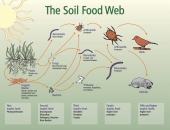
 1
1




 1
1

















"Never doubt that a small group of thoughtful, committed citizens can change the world; indeed, it's the only thing that ever has."-Margaret Mead "The only thing worse than being blind, is having sight but no vision."-Helen Keller








"The rule of no realm is mine. But all worthy things that are in peril as the world now stands, these are my care. And for my part, I shall not wholly fail in my task if anything that passes through this night can still grow fairer or bear fruit and flower again in days to come. For I too am a steward. Did you not know?" Gandolf












carl gibson wrote:
1: What is the best way to spread finished compost into the orchard so that the microbial community is not lost, but is transferred into the orchard soil?
2: Do you think that adding finished compost to the orchard in addition to the no till sheet composting will foster a stronger microbial community than simply no till sheet composting by itself?
3: As I am a very inexperienced composter, what is the best way to go about learning how to make top quality microbial rich compost? Any books or resources that you recommend?
"The rule of no realm is mine. But all worthy things that are in peril as the world now stands, these are my care. And for my part, I shall not wholly fail in my task if anything that passes through this night can still grow fairer or bear fruit and flower again in days to come. For I too am a steward. Did you not know?" Gandolf

|
Can you shoot lasers out of your eyes? Don't look at this tiny ad:
Learn Permaculture through a little hard work
https://wheaton-labs.com/bootcamp
|
